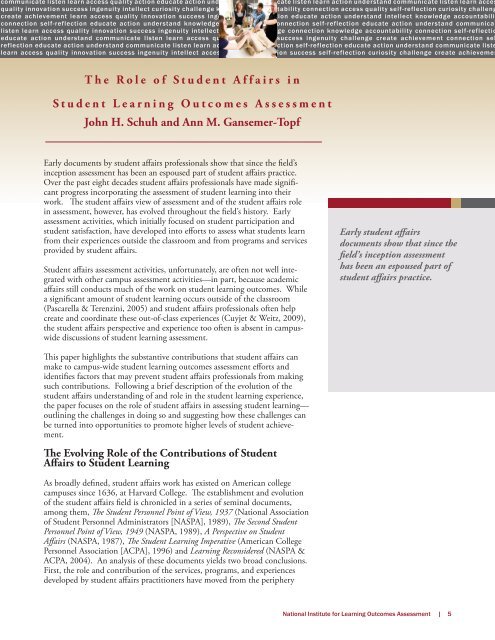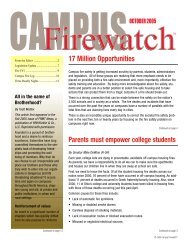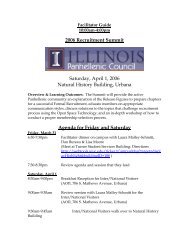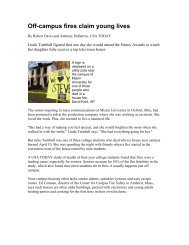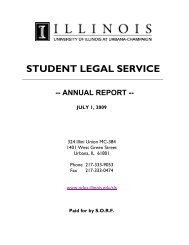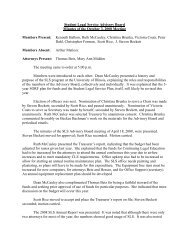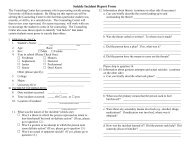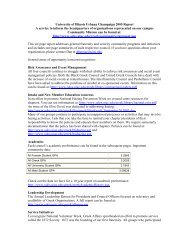StudentAffairsRole in Assessment - Office of the Dean of Students ...
StudentAffairsRole in Assessment - Office of the Dean of Students ...
StudentAffairsRole in Assessment - Office of the Dean of Students ...
You also want an ePaper? Increase the reach of your titles
YUMPU automatically turns print PDFs into web optimized ePapers that Google loves.
communicate listen learn access quality action educate action understand communicate listen learn action understand communicate listen learn acces<br />
quality <strong>in</strong>novation success <strong>in</strong>genuity <strong>in</strong>tellect curiosity challenge knowledge accountability connection access quality self-reflection curiosity challeng<br />
create achievement learn access quality <strong>in</strong>novation success <strong>in</strong>genuity self-reflection educate action understand <strong>in</strong>tellect knowledge accountabili<br />
connection self-reflection educate action understand knowledge accountability connection self-reflection educate action understand communicat<br />
listen learn access quality <strong>in</strong>novation success <strong>in</strong>genuity <strong>in</strong>tellect curiosity challenge connection knowledge accountability connection self-reflectio<br />
educate action understand communicate listen learn access quality <strong>in</strong>novation success <strong>in</strong>genuity challenge create achievement connection sel<br />
reflection educate action understand communicate listen learn achievement connection self-reflection educate action understand communicate liste<br />
learn access quality <strong>in</strong>novation success <strong>in</strong>genuity <strong>in</strong>tellect access quality <strong>in</strong>novation success self-reflection curiosity challenge create achievemen<br />
T h e R o l e o f S t u d e n t A f f a i r s i n<br />
S t u d e n t L e a r n i n g O u t c o m e s A s s e s s m e n t<br />
John H. Schuh and Ann M. Gansemer-Topf<br />
Early documents by student affairs pr<strong>of</strong>essionals show that s<strong>in</strong>ce <strong>the</strong> field’s<br />
<strong>in</strong>ception assessment has been an espoused part <strong>of</strong> student affairs practice.<br />
Over <strong>the</strong> past eight decades student affairs pr<strong>of</strong>essionals have made significant<br />
progress <strong>in</strong>corporat<strong>in</strong>g <strong>the</strong> assessment <strong>of</strong> student learn<strong>in</strong>g <strong>in</strong>to <strong>the</strong>ir<br />
work. The student affairs view <strong>of</strong> assessment and <strong>of</strong> <strong>the</strong> student affairs role<br />
<strong>in</strong> assessment, however, has evolved throughout <strong>the</strong> field’s history. Early<br />
assessment activities, which <strong>in</strong>itially focused on student participation and<br />
student satisfaction, have developed <strong>in</strong>to efforts to assess what students learn<br />
from <strong>the</strong>ir experiences outside <strong>the</strong> classroom and from programs and services<br />
provided by student affairs.<br />
Student affairs assessment activities, unfortunately, are <strong>of</strong>ten not well <strong>in</strong>tegrated<br />
with o<strong>the</strong>r campus assessment activities—<strong>in</strong> part, because academic<br />
affairs still conducts much <strong>of</strong> <strong>the</strong> work on student learn<strong>in</strong>g outcomes. While<br />
a significant amount <strong>of</strong> student learn<strong>in</strong>g occurs outside <strong>of</strong> <strong>the</strong> classroom<br />
(Pascarella & Terenz<strong>in</strong>i, 2005) and student affairs pr<strong>of</strong>essionals <strong>of</strong>ten help<br />
create and coord<strong>in</strong>ate <strong>the</strong>se out-<strong>of</strong>-class experiences (Cuyjet & Weitz, 2009),<br />
<strong>the</strong> student affairs perspective and experience too <strong>of</strong>ten is absent <strong>in</strong> campuswide<br />
discussions <strong>of</strong> student learn<strong>in</strong>g assessment.<br />
Early student affairs<br />
documents show that s<strong>in</strong>ce <strong>the</strong><br />
field’s <strong>in</strong>ception assessment<br />
has been an espoused part <strong>of</strong><br />
student affairs practice.<br />
This paper highlights <strong>the</strong> substantive contributions that student affairs can<br />
make to campus-wide student learn<strong>in</strong>g outcomes assessment efforts and<br />
identifies factors that may prevent student affairs pr<strong>of</strong>essionals from mak<strong>in</strong>g<br />
such contributions. Follow<strong>in</strong>g a brief description <strong>of</strong> <strong>the</strong> evolution <strong>of</strong> <strong>the</strong><br />
student affairs understand<strong>in</strong>g <strong>of</strong> and role <strong>in</strong> <strong>the</strong> student learn<strong>in</strong>g experience,<br />
<strong>the</strong> paper focuses on <strong>the</strong> role <strong>of</strong> student affairs <strong>in</strong> assess<strong>in</strong>g student learn<strong>in</strong>g—<br />
outl<strong>in</strong><strong>in</strong>g <strong>the</strong> challenges <strong>in</strong> do<strong>in</strong>g so and suggest<strong>in</strong>g how <strong>the</strong>se challenges can<br />
be turned <strong>in</strong>to opportunities to promote higher levels <strong>of</strong> student achievement.<br />
The Evolv<strong>in</strong>g Role <strong>of</strong> <strong>the</strong> Contributions <strong>of</strong> Student<br />
Affairs to Student Learn<strong>in</strong>g<br />
As broadly def<strong>in</strong>ed, student affairs work has existed on American college<br />
campuses s<strong>in</strong>ce 1636, at Harvard College. The establishment and evolution<br />
<strong>of</strong> <strong>the</strong> student affairs field is chronicled <strong>in</strong> a series <strong>of</strong> sem<strong>in</strong>al documents,<br />
among <strong>the</strong>m, The Student Personnel Po<strong>in</strong>t <strong>of</strong> View, 1937 (National Association<br />
<strong>of</strong> Student Personnel Adm<strong>in</strong>istrators [NASPA], 1989), The Second Student<br />
Personnel Po<strong>in</strong>t <strong>of</strong> View, 1949 (NASPA, 1989), A Perspective on Student<br />
Affairs (NASPA, 1987), The Student Learn<strong>in</strong>g Imperative (American College<br />
Personnel Association [ACPA], 1996) and Learn<strong>in</strong>g Reconsidered (NASPA &<br />
ACPA, 2004). An analysis <strong>of</strong> <strong>the</strong>se documents yields two broad conclusions.<br />
First, <strong>the</strong> role and contribution <strong>of</strong> <strong>the</strong> services, programs, and experiences<br />
developed by student affairs practitioners have moved from <strong>the</strong> periphery<br />
National Institute for Learn<strong>in</strong>g Outcomes <strong>Assessment</strong> | 5


